
Mindful eating, mindful burgers, mindful sex . . . pretty much everything is mindful lately. Paying attention has value, but what’s the goal of all that mindfulness?
Defining mindfulness exactly is like trying to define psychology or exercise in one line; you can do it, but it never quite captures everything. To summarize, mindfulness means aiming to be more aware of our immediate experience, with less reactive habit. Even that language may feel abstract to the average parent or child trying to find some peace and happiness. More than any single definition, what matters most is that there’s an intention. We spend an awful lot of our lives reacting to things we like or dislike in ways that aren’t always useful. When we break patterns and handle the uncertainty of life more easily, that’s beneficial. However you define it, mindfulness means living with less mindless habit and more ability to manage the fact that life is awfully hard sometimes.
So what does mindfulness with kids mean? Another way of framing mindfulness is as a group of mental traits. It’s not that anything specifically gets fixed by a practice of mindfulness; it’s guiding children toward long-term skills that make life easier. We teach children to become more attentive, less reactive, more compassionate, and resilient. From that perspective, mindfulness is a way to build life management abilities, but far from the only one. We offer children tools to handle the challenging road ahead through any means that fit.
When we say that mindfulness means “paying attention to what we’re doing,” we transfer this to our children by paying more attention to them when we’re together. “Staying calm under pressure” means taking a few breaths and not blowing a gasket when homework falls apart. When we say to treat others with compassion, that starts with how we speak to the frazzled guy at the airport dealing with our flight cancellation. Acknowledging honestly and openly that no one is perfect, we also recognize that we won’t stick to our own intentions all the time. We make mistakes and learn from them and keep going. Drawing our children into that part of life teaches them something too.
When it comes to teaching mindfulness, focus on the skills you want your children to develop. That matters more than whether they commit to a “mindfulness practice.” We build resilience by developing EF (Executive Function) and attention, emotional awareness, self-confidence, self-compassion, positive relationships, and all the rest that comes from being raised in a mindful, aware household. That doesn’t mean specifically meditating, but it does mean emphasizing a balanced lifestyle.
Mindfulness implies living with clarity in a certain way. We guide kids to pay attention every way we can — by taking moments to pause and look at a sea shell or by prioritizing activities that build attention (like reading, chess, and board games) over those that disrupt attention (excessive screen time). We discuss emotions and describe our own emotions. We live compassionately, read books that reflect other people’s perspectives, and generally immerse kids in compassion, while gradually considering if they’re ready for a compassion-based mindfulness practice.
Mindfulness is a tool kit for a different way of living, one that provides kids skills to manage life on their own one day. The good news is, kids don’t even have to practice it themselves to get there. They learn from watching us and from the overall way they live themselves. Of course, they eventually can learn from their own practice of mindfulness too. As you practice yourself, you’ll know exactly how to encourage your children to join you (links to books supporting mindfulness in kids can be found at howchildrenthrive.com). But it’s the big picture of how they are raised that counts most.
Consider This:
Imagine yourself from your child’s point of view. How would your child describe you to a friend? What’s fun and easy about you, what are your strengths, and what areas might you want to change?
Excerpted from How Children Thrive: The Practical Science of Raising Independent, Resilient, and Happy Kids.

Mark Bertin, MD, is a bestselling author who specializes in integrating mindfulness with other evidence-based neurodevelopmental care. His previous books include Mindful Parenting for ADHD and The Family ADHD Solution.

Buy your copy of How Children Thrive at your favorite bookseller!
Sounds True | Amazon | Barnes & Noble | Indiebound




 Mark Bertin is a pediatrician, author, professor, and mindfulness teacher specializing in neurodevelopmental behavioral pediatrics. He is the author of
Mark Bertin is a pediatrician, author, professor, and mindfulness teacher specializing in neurodevelopmental behavioral pediatrics. He is the author of 












